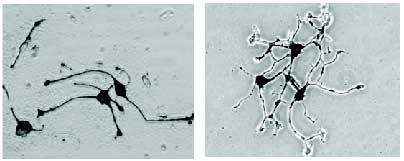Neurons are among the most long-lived cells in our bodies. They are generally not replaced when they are damaged, and therefore, it is important that the health of these cells is maintained throughout our life. However, in certain neuro-degenerative disorders such as Parkinson's disease and Alzheimer's disease, neurons degenerate and even die by a process known as apoptosis, leading to impairment of brain function. Thus, molecules that can promote neuronal survival have great potential therapeutic value. One such group of molecules are the neurotrophins, which comprising of nerve growth factor (NGF), BDNF, neurotrophin-3 and neurotrophin-4/5.
 Cells treated with a neurotoxin that mimics Parkinson's disease in the absence (left) or presence (right) of NGF. Cells receiving the neurotrophin exhibit greater neurite outgrowth.
Neurotrophins are involved in controlling survival of immature neurons during development and in the growth of elaborate network of neurites through which developing neurons make connections with other cells. In recent years it has been shown that neurotrophins can also modulate a diverse array of processes including neurite branching, cell migration, synaptic transmission and memory formation in mature neurons. They mediate their actions through Trk and p75NTR receptors. Activation of Trk signalling leads to survival and neurite outgrowth while the cellular outcome following p75NTR activation is highly cell type-dependent; it can variously induce cell survival or apoptosis, neurite outgrowth or retraction depending on the cytoplasmic interacting proteins.
Cells treated with a neurotoxin that mimics Parkinson's disease in the absence (left) or presence (right) of NGF. Cells receiving the neurotrophin exhibit greater neurite outgrowth.
Neurotrophins are involved in controlling survival of immature neurons during development and in the growth of elaborate network of neurites through which developing neurons make connections with other cells. In recent years it has been shown that neurotrophins can also modulate a diverse array of processes including neurite branching, cell migration, synaptic transmission and memory formation in mature neurons. They mediate their actions through Trk and p75NTR receptors. Activation of Trk signalling leads to survival and neurite outgrowth while the cellular outcome following p75NTR activation is highly cell type-dependent; it can variously induce cell survival or apoptosis, neurite outgrowth or retraction depending on the cytoplasmic interacting proteins.
Work in the Neurobiology Laboratory of the Department of Biochemistry at NUI, Galway is directed towards understanding the molecular mechanisms by which neurotrophins interfere with the apoptotic machinery to regulate cell death and induce neurite outgrowth. We have recently shown that NGF can prevent apoptotic cell death in cellular models of Parkinson's disease, and that the long-term functionality of the protected neurons is also maintained with particular regard to their ability to extend neurites. We have also recently shown that hypoxic conditions can increase the initial rate of NGF-induced neurite outgrowth. This work has received funding from the Health Research Board, Irish Research Council for Science, Engineering and Technology, the Higher Education Authority and the NUI, Galway Millennium Fund.
For further information contact:
Dr Adrienne Gorman,
Department of Biochemistry
National University of Ireland, Galway.
Tel: 091-492417; Fax: 091-495204
E-mail:
[email protected]
Web:
http://www.nuigalway.ie/faculties_departments/biochemistry/staff/gorman/
|

